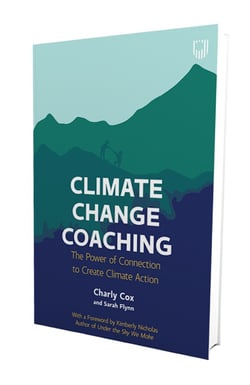This resource is also available in French. Click here to access the French version.
 Wouldn’t it be great if we could just tell people to care about climate change … and they did? While, logically, we know we can’t make people take action, when we see others stalling, we might wish we could. Defeated, many of us feel like we’ve tried everything and all that’s left must be to shake people and tell them how bad it’s going to get.
Wouldn’t it be great if we could just tell people to care about climate change … and they did? While, logically, we know we can’t make people take action, when we see others stalling, we might wish we could. Defeated, many of us feel like we’ve tried everything and all that’s left must be to shake people and tell them how bad it’s going to get.
Friendship as a tool for advancing change
What we’re really talking about here though is not wind farms or rainforests, but human behaviour change. If we focus on what helps someone to tackle change itself as opposed to the environmental reasons they should, different tools appear, many of which come from psychology. The good news is that we all already practise the greatest of these every day: friendship.
Friendship is at the heart of climate-related change, both individual and collective. We regularly see the incredible action people can take when they feel supported, versus how stalled they become when they feel isolated.
Putting relationships first
Making friends is always better than making enemies, but it is especially useful when we want to influence someone to change, which can be triggering. Demonstrating respect and understanding of someone’s cares and beliefs (not blaming or frightening them), makes the difference between helping someone to connect to the issue or entrenching them more deeply in their avoidance.
When we put relationships first and the issue second, we actually get further, faster with the issue. Yet making friends around this issue isn’t always easy. We often encounter people who disagree with us or challenge our beliefs. If we then hold our own beliefs too tightly, we may struggle to be open to influence ourselves, in turn discouraging them from being flexible. A big part of how we make people care about climate change is by managing our own emotions and caring as much about them as we do about the crisis.
 Respect, understanding and patience
Respect, understanding and patience
In our book, we share the story of Jill Bruce, a volunteer with the British Women’s Institute who lobbied her MP, Sir Bernard Jenkin – who often voted against the environment – to champion climate action. Despite having “never spoken to an MP about climate change before,” over six years, Jill staged non-confrontational climate events that she persuaded Bernard to chair, enabling him to learn about the crisis from experts.
Jill consciously built a relationship with Bernard, despite disagreeing with his position. “I have always treated Bernard with respect and listened as much as I have talked. I never attack. I simply hold him to account. As a result, we have developed a professional but friendly relationship.”
This relationship of trust allowed Bernard to shift his stance, such that: “Bernard … made a public video. In it he says that ‘he will dedicate his next years in politics to climate action’.” This tremendous turnaround is the result of Jill’s determination, tempered by her recognition that at the heart of influence is respect, understanding and patience.
Meaningful connections for climate change
We believe that the majority of people do care about climate change, but also need help to meaningfully connect to it and overcome fear of change. In a trusted relationship, we can help make that connection and offer someone the support to stick with change when it gets tough, safely building bridges between their beliefs and the issue without confrontation. They may then do the same in turn in their own climate conversations. Maybe that ripple effect could reduce polarisation and stimulate more action?





